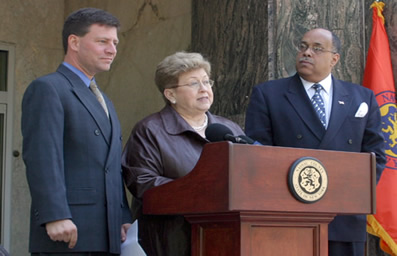May 22, 2006
Jacobs and Nassau lawmakers poised to scrutinize Coliseum development plan
Nassau County lawmakers, led by Presiding Officer Judy Jacobs (Woodbury) and Legislator Dave Denenberg (D-Merrick), chair of the Legislature’s Planning, Development and Environment Committee, are poised to begin the review process for the proposed Coliseum development project. The memorandum of understanding between the county and developers Charles Wang and Scott Rechler was filed with the county clerk’s office last week.
 |
PHOTO CAPTION: Nassau County Presiding Officer Judy Jacobs (Woodbury), at podium, is flanked by Legislator Dave Denenberg (D-Merrick) and Deputy Presiding Officer Roger Corbin (D-Westbury) at the announcement to begin the review process for the proposed Coliseum development project. |
“This will begin the review process of Nassau County’s most important development project in the last 100 years,” said Presiding Officer Jacobs. “How we proceed will influence the future of this county and fashion the footprint of the most valuable parcel of land in Nassau.”
The legislature’s Planning, Development & Environment Committee will hold three hearings:
June 8 – 7 p.m. – Wang/Rechler
June 13 – 7 p.m. - Administration
June 16 – 10 a.m. – Eric Naughton and wrap up
The first hearing, scheduled for June 8 at 7 p.m. will be presented by Charles Wang and Scott Rechler of the Lighthouse Group; June 13, 7 p.m., will be a presentation by the administration; and June 16, 10 a.m., will focus on the financial and economic impact of the proposed plan.
Among the highlights of the Lighthouse Development Group’s $1.6 billion proposal are: a $200 million renovation of the Nassau Coliseum; a commitment from the Islanders NHL team to stay until 2025; a canal lined with retail shops and mixed-use residential-commercial development; the creation of a pedestrian-friendly ‘Nassau Centre;’ an investment in a transportation system; the construction of a minor-league baseball stadium and the development of next generation housing. The project is expected to generate approximately $160 million in net new taxes through 2025.

